Pedialyte is a popular drink that is commonly used to treat dehydration in children. However, in recent years it has gained popularity as a hangover cure and as a sports drink for athletes.
With its high electrolyte content and claims of hydration and replenishment, many people have begun to wonder if Pedialyte is a healthy option for adults. In this article, we will take a closer look at the ingredients in Pedialyte, the potential health benefits, what experts have to say about it, and ultimately answer the question: Is Pedialyte good for you?
What is Pedialyte?
Pedialyte is a brand of oral electrolyte solution that is designed to help prevent dehydration and restore electrolyte balance in the body. It was originally formulated in the 1960s as a way to treat dehydration in children with diarrhea, vomiting, or other illnesses.
However, in recent years, it has become popular as a rehydration solution for athletes, as well as a hangover cure for adults.
Pedialyte is available in a variety of flavors and forms, including liquid, powder, and freezer pops. It contains a specific balance of sodium, potassium, and other electrolytes that are important for hydration and electrolyte replenishment in the body.
Nutrition Facts of Pedialyte
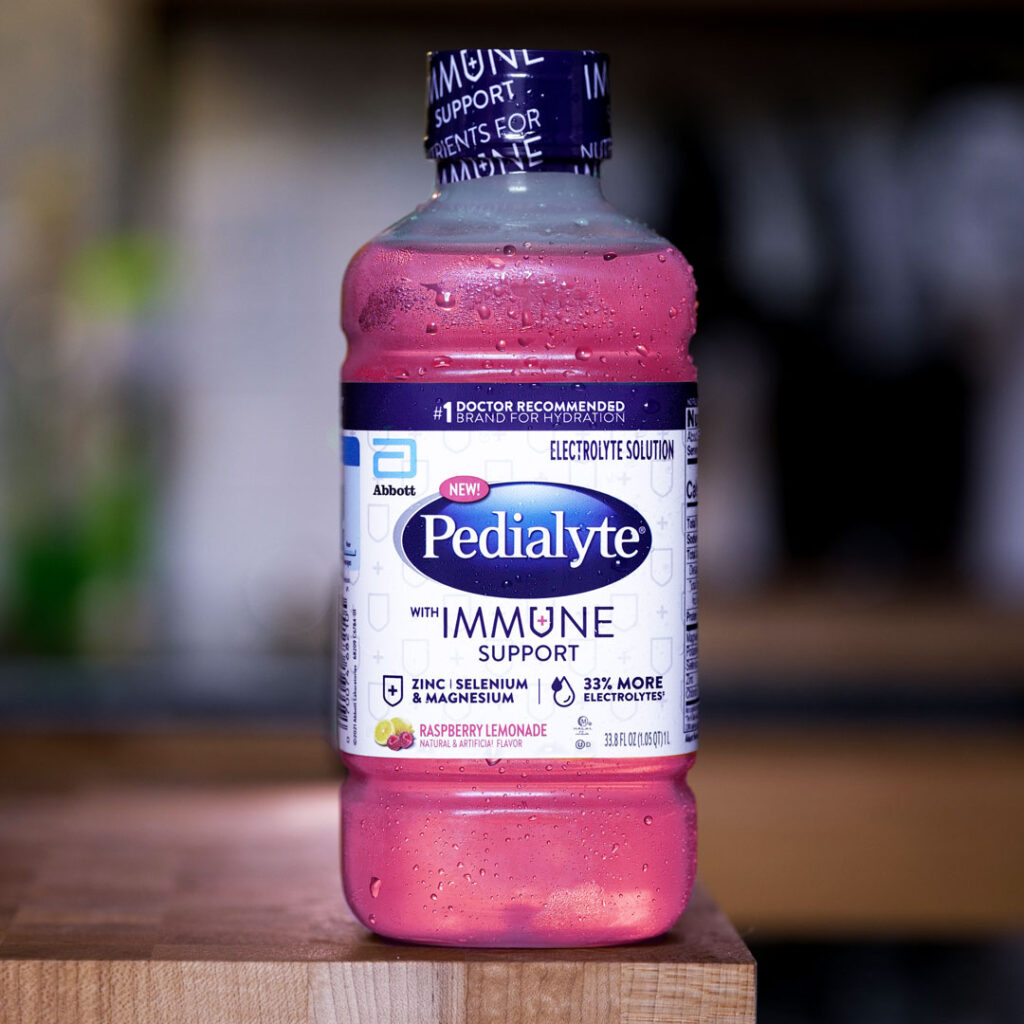
The nutritional facts of Pedialyte can vary depending on the flavor and form of the product. However, here are the nutritional facts and ingredients for the classic unflavored liquid Pedialyte:
- Serving Size: 8 fl oz (237 ml)
- Calories: 25
- Total Fat: 0g
- Sodium: 370mg
- Potassium: 280mg
- Total Carbohydrates: 6g
- Sugars: 5g
- Protein: 0g
Ingredients:
- Water: The primary ingredient in Pedialyte is water, which is necessary for hydration.
- Dextrose: Dextrose is a type of simple sugar that is added to Pedialyte to provide energy and aid in the absorption of electrolytes.
- Citric Acid: Citric acid is a weak organic acid that is added to Pedialyte to enhance flavor and act as a preservative.
- Salt: Salt (sodium chloride) is added to Pedialyte to help restore sodium and electrolyte balance in the body.
- Potassium Citrate: Potassium citrate is a source of potassium that is added to Pedialyte to help restore electrolyte balance, aid hydration, and improve skeletal health.
- Sodium Citrate: Sodium citrate is added to Pedialyte as a buffering agent to help maintain the pH of the solution.
- Natural and Artificial Flavor: These are added to Pedialyte to enhance the taste.
- Sucralose: Sucralose is an artificial sweetener that is used to sweeten Pedialyte without adding calories.
- Acesulfame Potassium: Acesulfame potassium is another artificial sweetener that is used in Pedialyte to enhance the sweetness without adding calories.
- Zinc Gluconate: Zinc is a mineral that is added to Pedialyte to support the immune system.
Overall, Pedialyte is a low-calorie, low-sugar, and electrolyte-rich beverage designed to help restore hydration and electrolyte balance in the body.
Pros and Cons
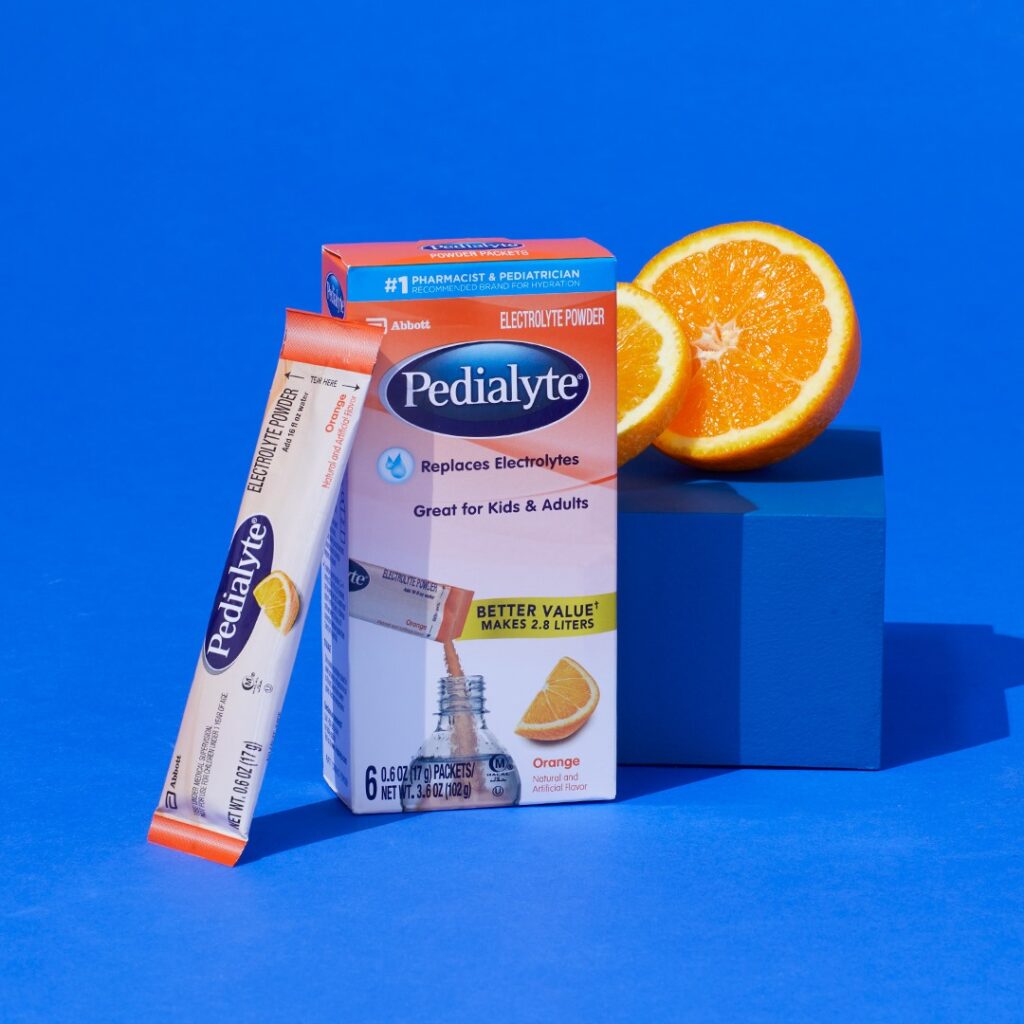
Here are some pros and cons of Pedialyte:
Pros:
- Hydration: Pedialyte is an effective way to rehydrate the body and restore electrolyte balance, particularly in cases of dehydration caused by illness, exercise, or alcohol consumption.
- Electrolyte Balance: Pedialyte contains a balanced ratio of electrolytes such as sodium, potassium, and chloride, which are crucial for proper muscle contraction, nerve transmission, and fluid balance in the body.
- Low-Calorie: Pedialyte is a low-calorie beverage, making it a good option for those who are trying to maintain a healthy weight or are watching their calorie intake.
- Variety: Pedialyte comes in a variety of flavors and forms, making it easy to find a flavor that appeals to your taste buds or a form that is convenient for your needs.
Cons:
- Cost: Pedialyte can be more expensive than other sports drinks or hydration solutions, which can be a barrier for some people.
- Added Sugars: Some flavors of Pedialyte may contain added sugars or artificial sweeteners, which can be a concern for those who are trying to limit their sugar intake or have certain health conditions.
- Sodium Content: While sodium is an important electrolyte, some people may need to limit their sodium intake for health reasons, such as high blood pressure or kidney disease. The sodium content in Pedialyte may be too high for some individuals.
- Not a Substitute for Water: While Pedialyte can be effective for rehydration, it is not a substitute for plain water as a daily source of hydration. It should be used in cases of dehydration or when electrolyte balance needs to be restored.
Overall, Pedialyte can be an effective and convenient way to rehydrate the body and restore electrolyte balance. However, it is important to consider the potential drawbacks and use it in moderation as needed.
Health Benefits and Scientific Studies About Pedialyte
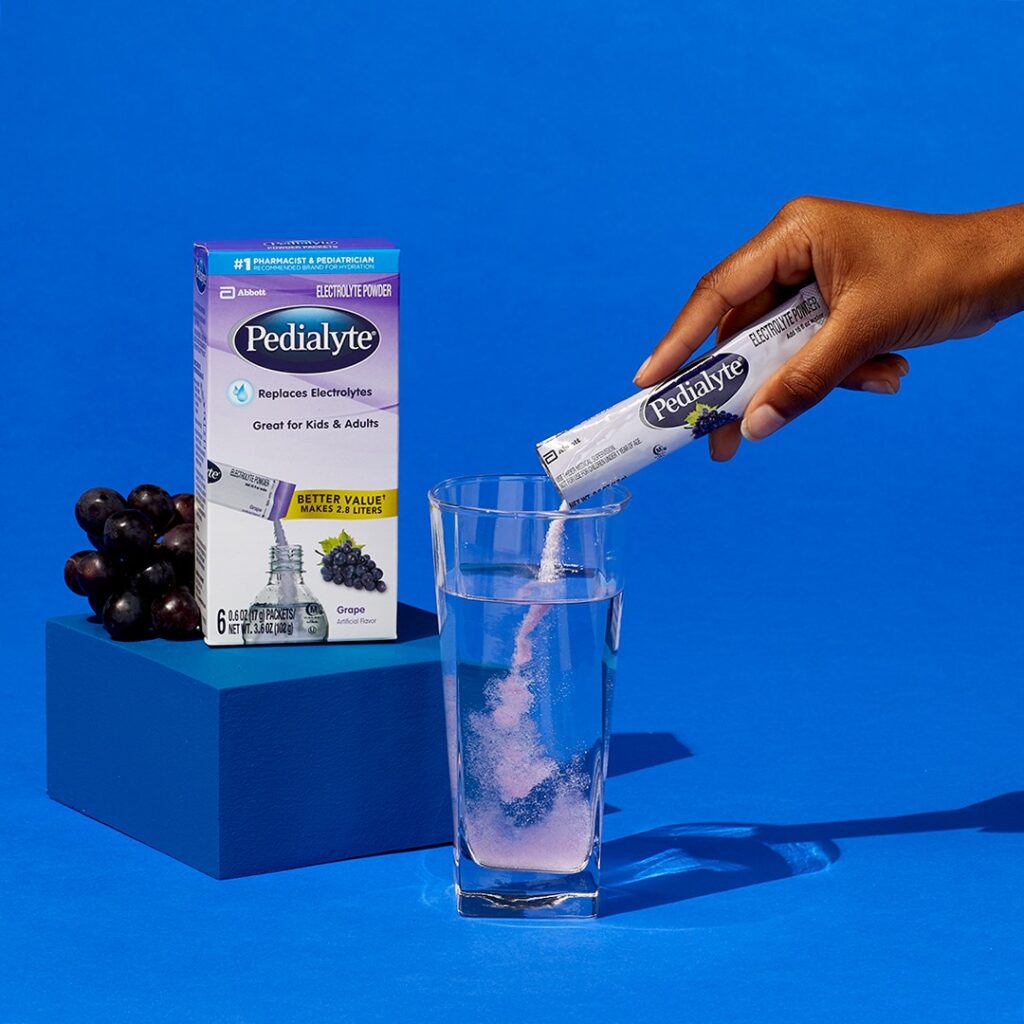
Pedialyte is known for its ability to rehydrate the body and restore electrolyte balance, particularly in cases of dehydration caused by illness, exercise, or alcohol consumption. Here are some scientific studies and references on the health benefits of Pedialyte:
- Effective for Rehydration: Studies found that Pedialyte was effective for rehydration in children with acute gastroenteritis. The study showed that Pedialyte was superior to other beverages in terms of rehydration and electrolyte balance.
- Recommended for Athletes: The American Academy of Pediatrics recommends Pedialyte as an option for athletes who need to rehydrate after exercise. The Academy notes that Pedialyte contains a balanced ratio of electrolytes and can be effective for replenishing fluids and electrolytes lost during exercise.
- Helps with Hangovers: Pedialyte may assist with issues such as dehydration, electrolyte imbalance, and low blood sugar, but it is not effective in addressing other factors such as sleep disruption and stomach upset.
- Restores Fluid and Electrolyte Balance: Pedialyte contains a balanced ratio of electrolytes such as sodium, potassium, and chloride, which are crucial for proper muscle function, nerve transmission, and fluid balance in the body. When the body is dehydrated or electrolyte balance is disrupted, Pedialyte can help restore these levels and promote proper bodily function.
Overall, Pedialyte is a well-researched and effective solution for rehydration and electrolyte balance. While it is primarily marketed towards children, it can also be beneficial for adults in certain situations, such as after exercise or alcohol consumption.
However, it is important to use Pedialyte in moderation and as directed, as excessive consumption can lead to unwanted side effects.
What Do Medical Experts Say About Pedialyte?
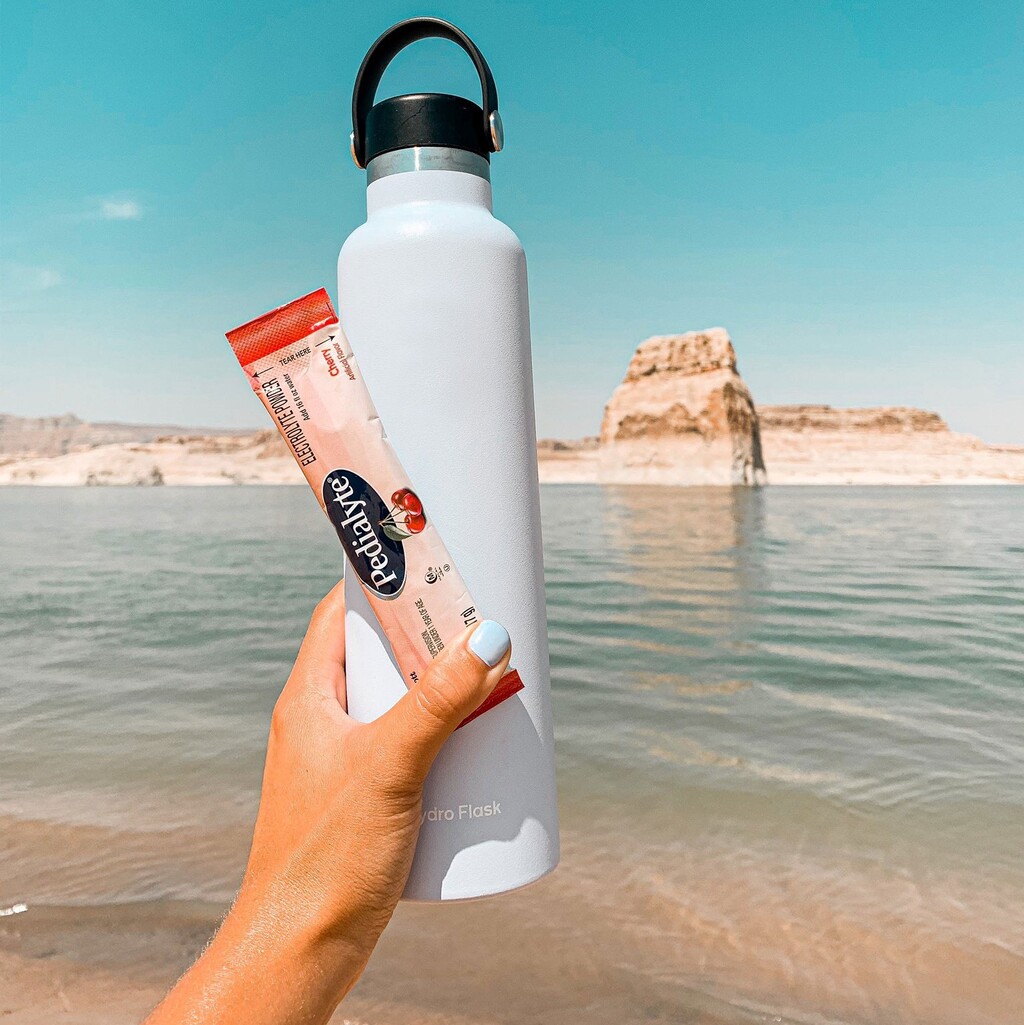
Pedialyte is often recommended by medical experts for its ability to rehydrate the body and restore electrolyte balance. Here are some quotes and references from medical experts:
- American Academy of Pediatrics: “Oral rehydration solutions, such as Pedialyte, Infalyte, or Rehydralyte, should be used to treat dehydration caused by acute gastroenteritis.” Pedialyte is a good option in situations of diarrhea because it contains fewer carbs. Large quantities of unabsorbed carbs can cause an increase in the flow of water and electrolytes into the intestine, potentially exacerbating the condition.
- Harvard Health Publishing: “If you’re severely dehydrated, you may need intravenous fluids in a hospital. But for most cases of mild to moderate dehydration, oral rehydration therapy such as Pedialyte is effective.”
- Mayo Clinic: “For most adults, sports drinks such as Gatorade and Powerade are fine when consumed in moderation. However, these drinks can contain a lot of sugar and calories, so Pedialyte may be a better choice if you’re looking for a rehydration solution that’s lower in sugar and calories.”
- “Pedialyte can be a great option for anyone who needs to replace fluids and electrolytes, including adults. It’s often used by athletes and people who are ill, but it can also be used after a night of heavy drinking.” – Samantha Cassetty, RD, NBC News Contributor
- “Pedialyte is formulated to restore the body with the right balance of sugars and electrolytes, making it a great option for rehydration after exercise, illness or even a long day in the sun.” – Katherine Brooking, MS, RD, Co-founder of Appetite for Health
Overall, medical experts agree that Pedialyte is an effective solution for rehydration and electrolyte balance, particularly in cases of dehydration caused by illness or exercise. It is often recommended over other sports drinks due to its balanced electrolyte composition and lower sugar content.
Who Should Avoid Pedialyte?
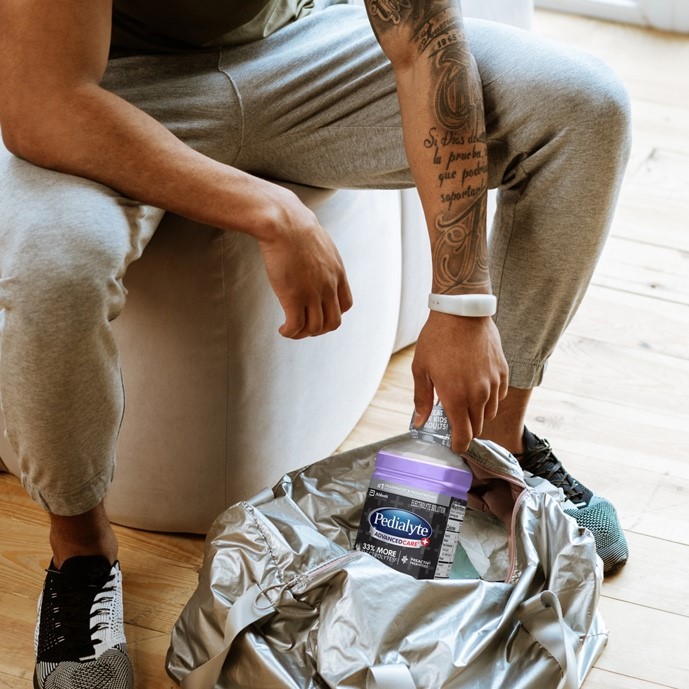
Pedialyte is generally safe and effective for most people, including children and adults. However, there are some situations where individuals should be cautious or avoid using Pedialyte altogether.
- Individuals with kidney problems: Pedialyte contains electrolytes, such as sodium and potassium, which are normally excreted by the kidneys. For individuals with kidney problems, these electrolytes can build up in the body and lead to complications. Therefore, individuals with kidney problems should talk to their doctor before using Pedialyte.
- Individuals with heart problems: Pedialyte contains a high amount of sodium, which can lead to fluid retention and high blood pressure in individuals with heart problems. Again, it is important to consult with a doctor before using Pedialyte.
- Individuals with diabetes: Pedialyte contains sugar, which can cause a spike in blood sugar levels in individuals with diabetes. Therefore, individuals with diabetes should opt for sugar-free versions of Pedialyte or consult with their doctor before using Pedialyte.
It is important to note that while these individuals should be cautious about using Pedialyte, it is still a safe and effective option for many people in need of rehydration and electrolyte replacement. As always, it is recommended to consult with a doctor before starting any new health regimen.
Alternatives to Pedialyte
Here are three alternatives to Pedialyte:
- Coconut water: Coconut water is a natural source of electrolytes, including potassium, sodium, and magnesium, and is known to be effective in rehydration. It is also low in sugar and calories compared to many sports drinks.
- Gatorade: Gatorade is a popular sports drink that contains a balanced amount of electrolytes, carbohydrates, and fluids that help in hydration and restoring energy levels among athletes. It is also widely available in various flavors and formulations.
- Watermelon juice: Watermelon juice is a refreshing and natural source of hydration that is rich in electrolytes, including potassium and magnesium. It is also low in sugar and calories, making it a healthy alternative to many sports drinks.
It is important to note that while these alternatives can help with rehydration, they may not provide the same level of medical-grade hydration as Pedialyte. It is always recommended to consult with a healthcare provider before using any hydration product or changing dietary habits.
FAQ
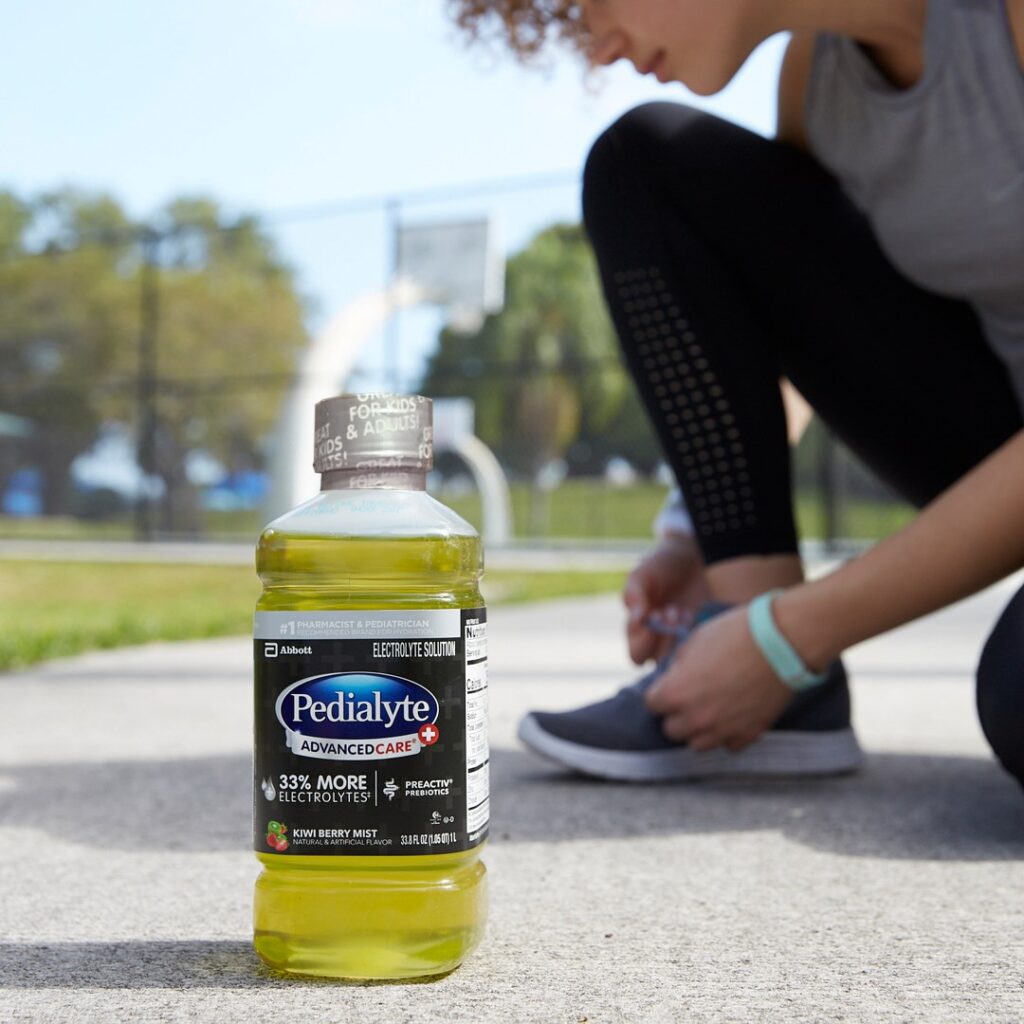
What is Pedialyte?
Pedialyte is a medical-grade oral rehydration solution that is designed to quickly replenish fluids, electrolytes, and minerals lost during periods of dehydration.
What are the benefits of Pedialyte?
Pedialyte helps to rehydrate the body and replenish lost fluids and electrolytes, which can be beneficial in cases of dehydration due to illnesses like diarrhea, vomiting, or excessive sweating.
Who should use Pedialyte?
Pedialyte is suitable for individuals of all ages who are experiencing mild to moderate dehydration due to illnesses, sweating, or other reasons. It is particularly useful for infants, young children, and older adults who may be more vulnerable to dehydration.
Can Pedialyte be used for hangovers?
Pedialyte can be used to help alleviate some of the symptoms of a hangover, such as dehydration and electrolyte imbalance, but it is not a cure for hangovers.
Is Pedialyte safe for pregnant women?
Pedialyte is generally considered safe for pregnant women, but it is always best to consult with a healthcare provider before using any medication or hydration product during pregnancy.
How do you use Pedialyte?
Pedialyte can be consumed orally in small sips or by using a spoon or syringe for infants and young children. It is best to follow the recommended dosage on the product label or as advised by a healthcare provider.
Is Pedialyte available over the counter?
Yes, Pedialyte is available over the counter at most pharmacies and grocery stores. It is also available online through various retailers.
Does Pedialyte have any side effects?
Pedialyte is generally safe and well-tolerated, but some individuals may experience side effects such as nausea, vomiting, or diarrhea. If you experience any adverse effects, stop using Pedialyte and consult with a healthcare provider.
Conclusion: Is Pedialyte good for you?
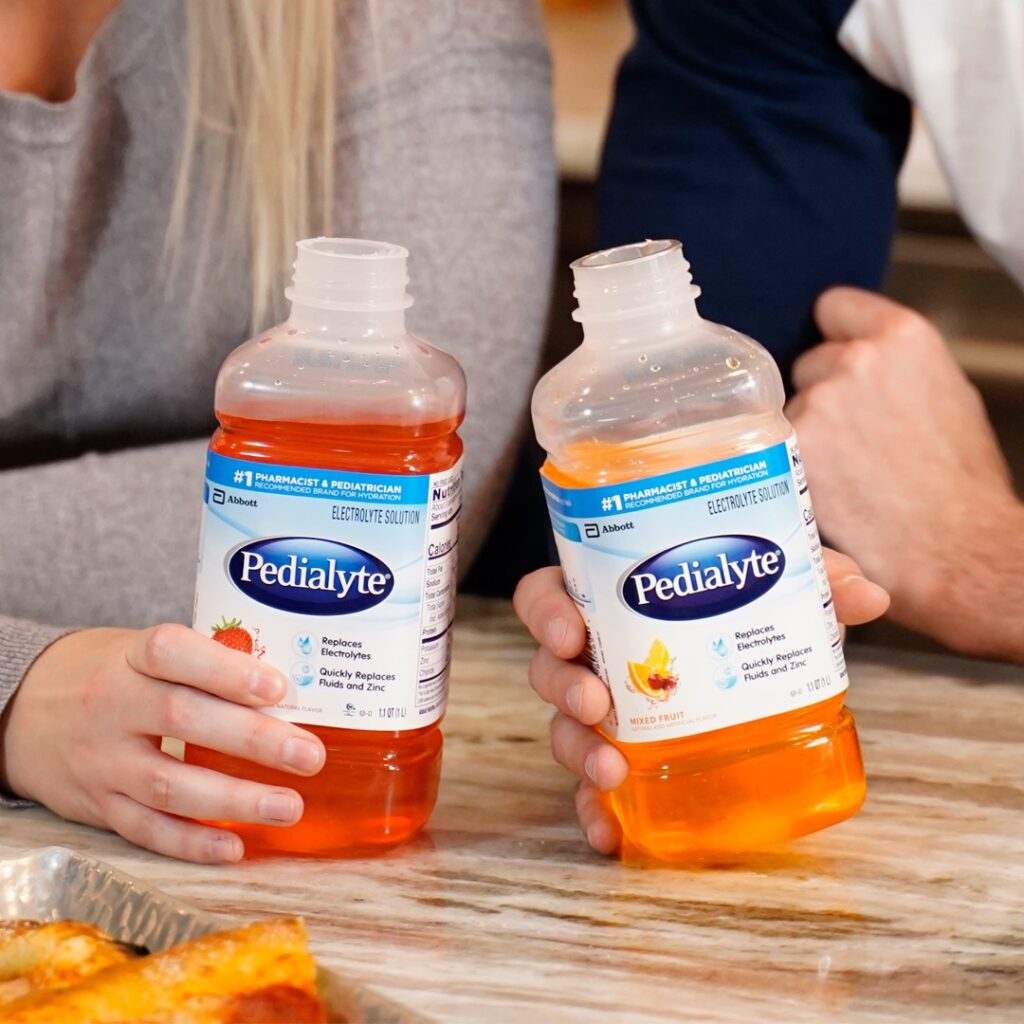
Pedialyte is a medical-grade oral rehydration solution that can be beneficial for individuals experiencing dehydration due to illnesses, excessive sweating, or other reasons. It is a safe and effective way to quickly replenish fluids, electrolytes, and minerals lost during periods of dehydration.
While there may be some potential side effects, they are generally mild and uncommon. Overall, Pedialyte is considered good for you and is a reliable option for those in need of rehydration. It is always best to consult with a healthcare provider before using any hydration product or medication.
References:
- Rao SS;Summers RW;Rao GR;Ramana S;Devi U;Zimmerman B;Pratap BC; (n.d.). Oral rehydration for viral gastroenteritis in adults: A randomized, controlled trial of 3 solutions. JPEN. Journal of parenteral and enteral nutrition. Retrieved April 13, 2023, from https://pubmed.ncbi.nlm.nih.gov/16931613/
- Moseley, K. F., Weaver, C. M., Appel, L., Sebastian, A., & Sellmeyer, D. E. (2013, March). Potassium citrate supplementation results in sustained improvement in calcium balance in older men and women. Journal of bone and mineral research : the official journal of the American Society for Bone and Mineral Research. Retrieved April 13, 2023, from https://www.ncbi.nlm.nih.gov/pmc/articles/PMC3578058/
- U.S. Department of Health and Human Services. (n.d.). Office of dietary supplements – zinc. NIH Office of Dietary Supplements. Retrieved April 13, 2023, from https://ods.od.nih.gov/factsheets/Zinc-Consumer/
- DW;, S. H. L. H. (n.d.). Muscle contraction. Cold Spring Harbor perspectives in biology. Retrieved April 13, 2023, from https://pubmed.ncbi.nlm.nih.gov/29419405/
- U.S. Department of Health and Human Services. (n.d.). Treatment of viral gastroenteritis (“stomach flu”) – niddk. National Institute of Diabetes and Digestive and Kidney Diseases. Retrieved April 13, 2023, from https://www.niddk.nih.gov/health-information/digestive-diseases
- Millard-Stafford, M., Snow, T. K., Jones, M. L., & Suh, H. G. (2021, August 25). The beverage hydration index: Influence of electrolytes, carbohydrate and protein. Nutrients. Retrieved April 13, 2023, from https://www.ncbi.nlm.nih.gov/pmc/articles/PMC8465972/
- Gericke, B., Amiri, M., & Naim, H. Y. (2016, December). The multiple roles of sucrase-isomaltase in the intestinal physiology. Molecular and cellular pediatrics. Retrieved April 13, 2023, from https://www.ncbi.nlm.nih.gov/pmc/articles/PMC4728165/
- Nutrition facts. Fluid replacement, electrolyte solution (include PEDIALYTE), 1 cup (8 fl oz) – Health Encyclopedia – University of Rochester Medical Center. (n.d.). Retrieved April 13, 2023, from https://www.urmc.rochester.edu/encyclopedia
- Grillo, A., Salvi, L., Coruzzi, P., Salvi, P., & Parati, G. (2019, August 21). Sodium intake and hypertension. Nutrients. Retrieved April 13, 2023, from https://www.ncbi.nlm.nih.gov/pmc/articles/PMC6770596/
- Drsmitty. (2018, February 27). BMEG442: Engineering exercise and sports. BMEG442 Engineering Exercise and Sports. Retrieved April 13, 2023, from https://sites.udel.edu/coe-engex
- Claire McCarthy, M. D. (2020, June 17). When treating stomach bugs, the best solution may be the simplest one. Harvard Health. Retrieved April 13, 2023, from https://www.health.harvard.edu/blog
You might also like to check out some recently published reviews:

Leave a Reply